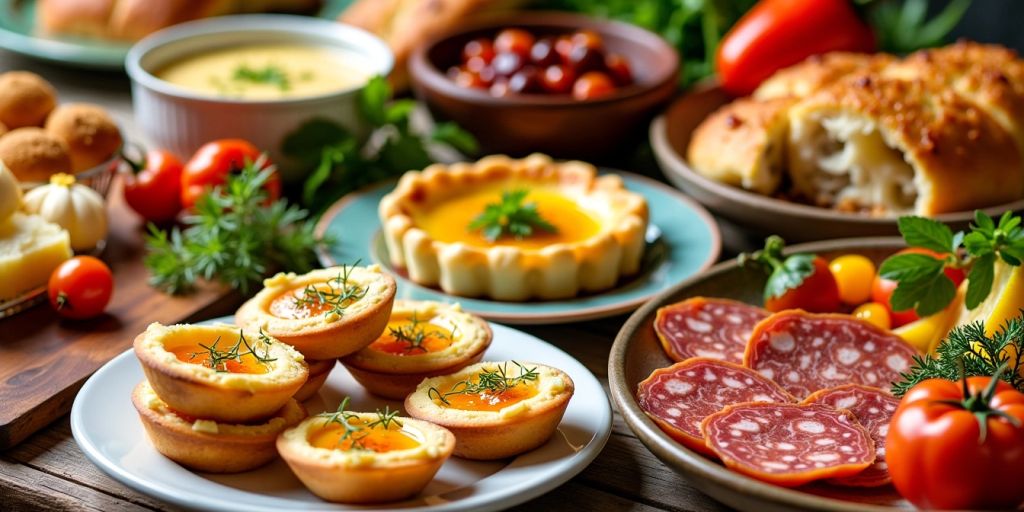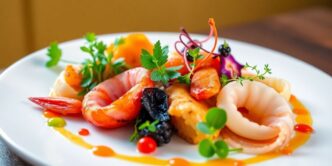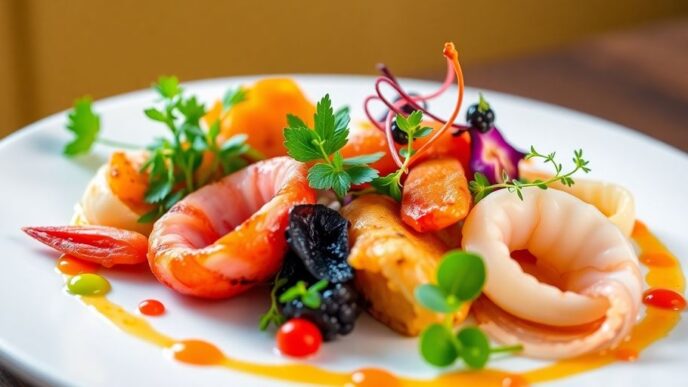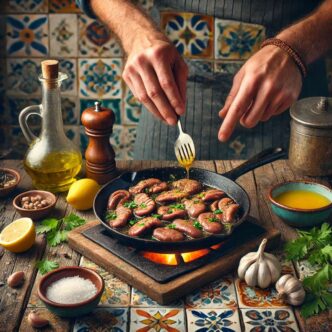Exploring Iconic Portuguese Dishes
Bacalhau: Portugal’s Beloved Salt Cod
Bacalhau is often called Portugal’s national dish. It comes in many forms, including:
- Bacalhau à Brás: Shredded cod with potatoes and eggs.
- Bacalhau com Natas: Cod baked with cream.
- Bacalhau com Broa: Cod topped with a crunchy cornbread crust.
This dish showcases the rich flavors of Portuguese cuisine.
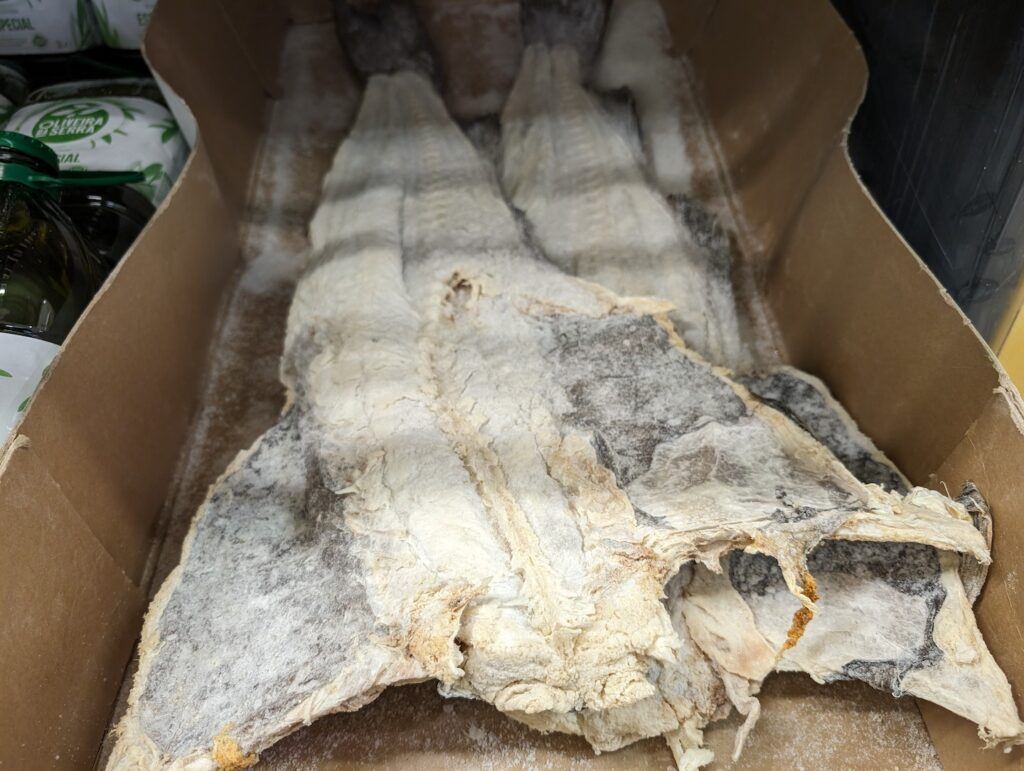
Francesinha: Porto’s Hearty Sandwich
Francesinha is a must-try when in Porto. This sandwich features:
- Layers of bread and various meats.
- A rich tomato and beer sauce.
- Topped with melted cheese.
It’s a filling meal that reflects the heartiness of local food.
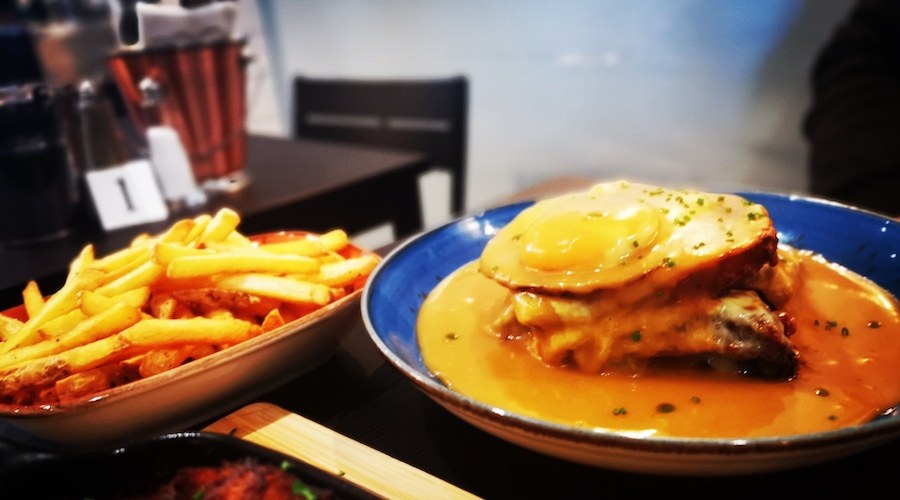
Pastéis de Nata: The Famous Custard Tart
Pastéis de nata are iconic Portuguese desserts. These tarts have:
- A flaky pastry crust.
- A creamy custard filling.
- A hint of cinnamon and lemon.
They are a delightful treat that you cannot miss during your culinary journey.
Regional Specialties Across Portugal
Seafood in the Algarve
The Algarve is famous for its fresh seafood. Here are some must-try dishes:
- Cataplana de Marisco: A seafood stew cooked in a special copper pot.
- Grilled Sardines: A simple yet delicious dish enjoyed by locals.
- Octopus Salad: Tender octopus mixed with fresh vegetables.
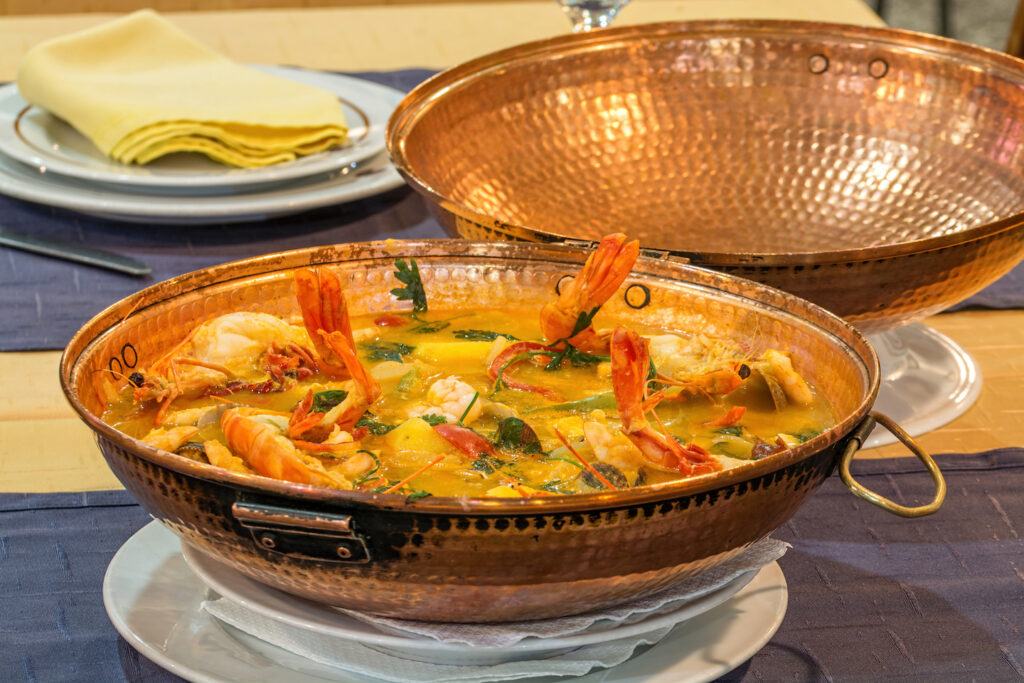
Cheeses of Serra da Estrela
This region is known for its unique cheeses. Key highlights include:
- Queijo Serra da Estrela: A soft cheese made from sheep’s milk.
- Aged Cheeses: Rich flavors that develop over time.
- Pairing with Bread: Enjoy with local bread for a perfect snack.
Meats of the Alentejo
Alentejo offers hearty meat dishes. Don’t miss:
- Porco Preto: Black pork known for its rich taste.
- Lamb Stews: Slow-cooked for deep flavors.
- Smoked Sausages: A traditional favorite in many meals.
These regional specialties showcase the authentic Portuguese cuisine. From the seafood delights of the Algarve to the rich meats of Alentejo, each dish tells a story of tradition and flavor.
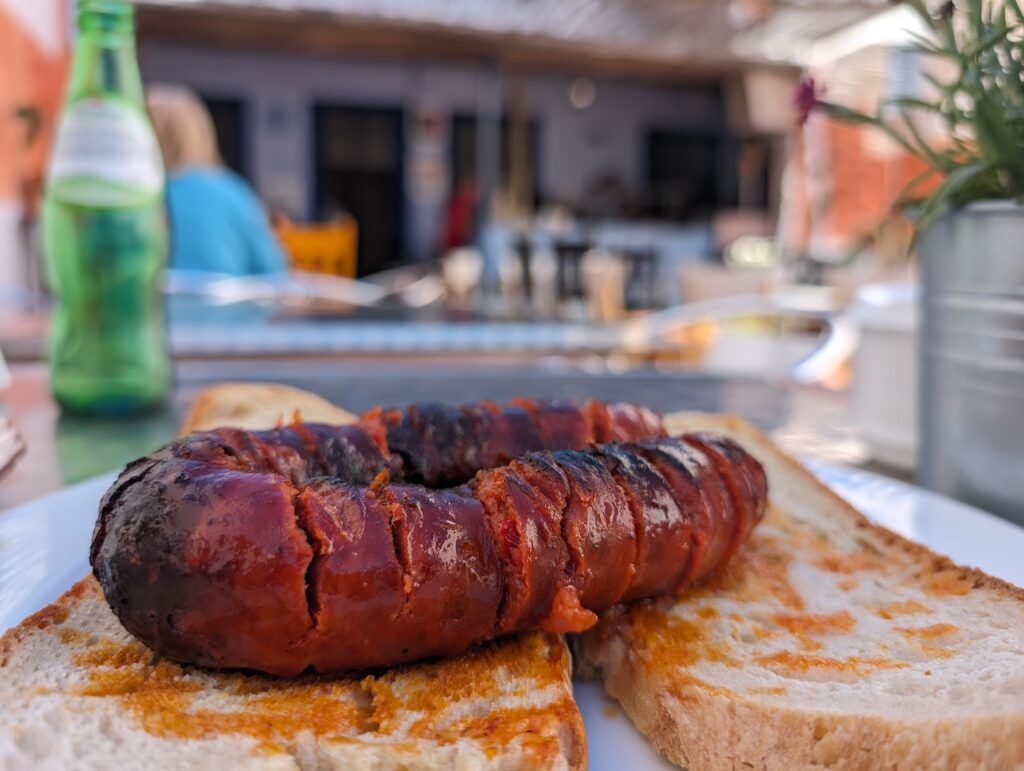
The Influence of Mediterranean, African, and Latin American Cultures
Mediterranean Flavors in Portuguese Cuisine
Portuguese food is bright and fresh. It features ingredients like:
- Fish and seafood
- Olive oil
- Tomatoes and spices
These elements create a unique taste that is loved by many.
African Spices and Their Impact
African spices add depth to Portuguese dishes. They transform simple meals into flavorful experiences. Some popular spices include:
- Piri-piri
- Cumin
- Coriander
These spices make every bite exciting.
Latin American Fruits in Portuguese Dishes
Latin American fruits have found a home in Portuguese cooking. They are used in both savory and sweet dishes. Some examples are:
- Pineapple in desserts
- Passion fruit in sauces
- Guava in pastries
These fruits bring a tropical twist to traditional recipes.

Seafood Delights from Portugal’s Coastline
Portugal’s coastline offers a treasure trove of seafood delights. Here are some must-try dishes:
Grilled Sardines: A Coastal Favorite
- Grilled sardines are a classic dish. They are seasoned with sea salt and grilled over hot coals.
- The smoky flavor makes them irresistible. Enjoy them with a slice of bread and a squeeze of lemon.
- This dish is a staple at summer festivals along the coast.
Octopus Dishes: A Portuguese Staple
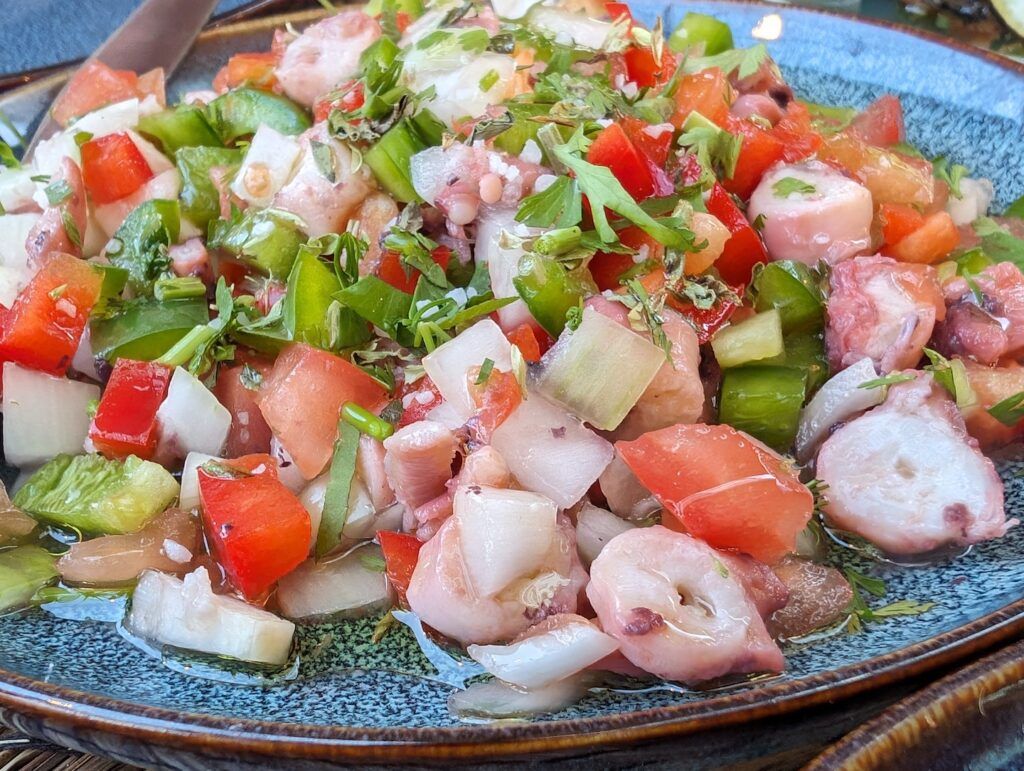
- Octopus is prepared in many ways. One popular dish is Polvo à Lagareiro, featuring tender octopus with olive oil.
- It’s often served with crispy potatoes, making it a hearty meal.
- The flavors reflect the rich maritime culture of Portugal.
Cataplana de Marisco: A Seafood Stew
- Cataplana de Marisco is a traditional seafood stew. It’s cooked in a special copper pot, enhancing the flavors.
- This dish includes a mix of shellfish, fish, and spices, creating a delightful taste.
- It’s perfect for sharing with friends and family.
Portugal’s seafood is fresh and flavorful, reflecting its coastal charm. Don’t miss out on these delicious dishes!
Experiencing Portuguese Cuisine Through Cooking Classes
Traditional Portuguese Cooking Classes
Join a cooking class to learn about Portugal’s rich culture through its food. You will:
- Discover traditional recipes.
- Use fresh, local ingredients.
- Get hands-on experience with expert chefs.
Seafood Preparation Workshops
In these workshops, you can:
- Learn to cook fresh seafood dishes.
- Understand the importance of seafood in Portuguese cuisine.
- Taste your creations with fellow participants.
Learning to Make Pastéis de Nata
This iconic dessert is a must-try. In the class, you will:
- Master the art of making the perfect custard tart.
- Explore the history behind pastéis de nata.
- Enjoy your delicious creations with coffee.
Cooking classes offer a fun way to connect with Portugal’s culinary heritage. You will leave with new skills and a deeper appreciation for the flavors of this beautiful country.

Wine and Cheese Pairings in Portugal
Porto’s Renowned Port Wine
Port wine is a must-try when in Portugal. It’s rich and sweet, perfect with desserts. Pair it with:
- Pastéis de Nata for a delightful contrast.
- Cheese from Serra da Estrela for a creamy balance.
- Chocolate desserts to enhance its sweetness.
Douro Valley Wines
The Douro Valley is famous for its stunning vineyards. Here, you can find:
- Full-bodied reds that go well with meats.
- Crisp whites that complement seafood.
- Tawny ports for a unique tasting experience.
Portuguese Cheese Varieties
Portugal has a variety of cheeses to explore. Some favorites include:
- Queijo Serra da Estrela: Soft and creamy, great with red wine.
- Queijo de Azeitão: A tangy cheese that pairs well with white wine.
- Queijo da Ilha: A hard cheese perfect for snacking with port wine.
Enjoying wine and cheese in Portugal is a delightful experience. Each pairing tells a story of the region’s rich flavors and traditions. Don’t miss out on this culinary adventure!
Tips for Enjoying Authentic Portuguese Food
Visiting Family-Owned Restaurants
- Seek out small, family-owned restaurants for genuine dishes.
- Enjoy the warm hospitality and traditional recipes.
- Support local communities while tasting authentic flavors.
Exploring Local Markets
- Visit local markets to discover fresh ingredients.
- Engage with vendors to learn about Portuguese cuisine.
- Sample local snacks and seasonal produce.
Saving Room for Dessert
- Don’t miss the iconic pastéis de nata.
- Pair your dessert with a strong espresso.
- Try different bakeries for unique takes on this treat.

